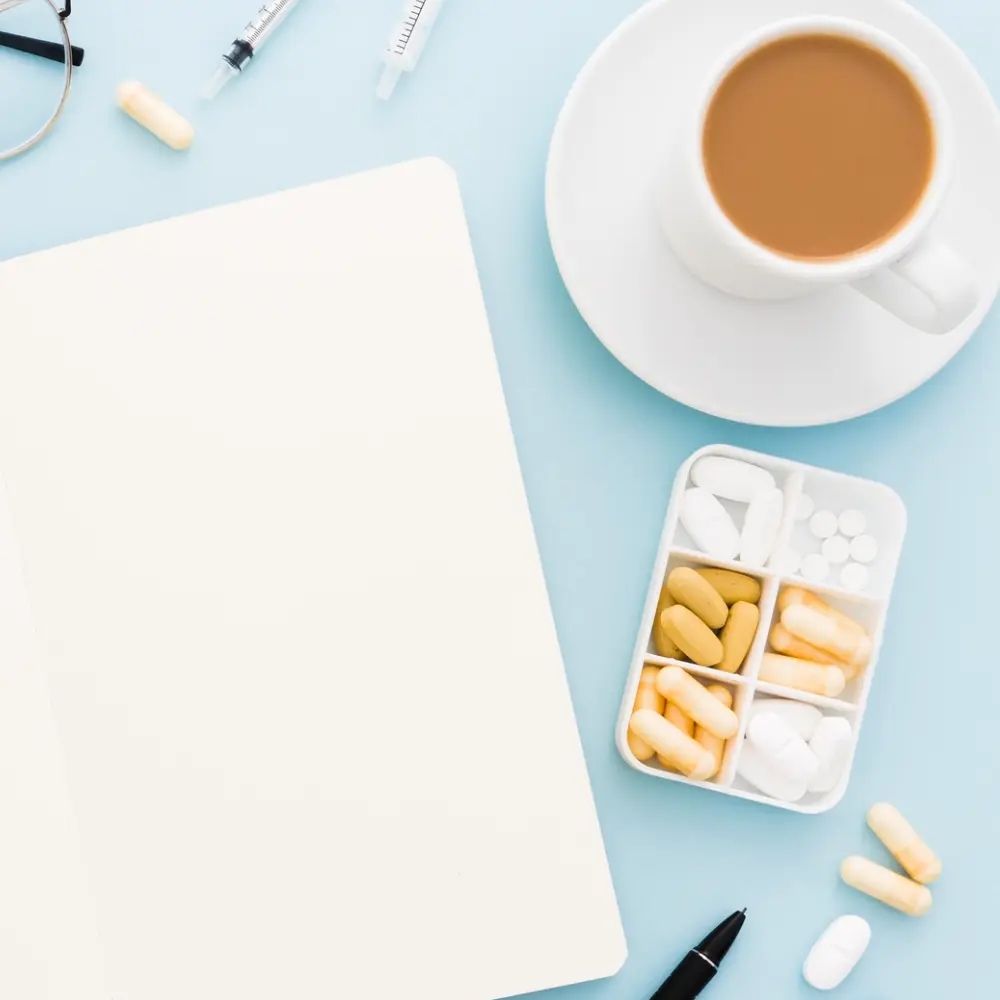Drinking coffee is a cherished daily ritual for many, a routine as ingrained as taking daily prescribed medications. But when it comes to combining these two routines, things might not be as straightforward as they seem. Particularly if you’re among the millions who take the nonsteroidal anti-inflammatory drug (NSAID) Meloxicam for pain management. The question then arises, “Can I drink coffee while taking Meloxicam?” The answer is nuanced, with various factors at play, from individual physiology to scientific research. This article explores this critical question in detail, providing you with the knowledge you need to make informed decisions about your health. We’ll delve into the specifics of Meloxicam, the effects of coffee on the body, and how the two may interact. Let’s navigate through the maze of information, myths, and realities surrounding coffee consumption while on Meloxicam therapy.
Coffee and Meloxicam – Key Takeaway
- Moderation is key: Moderate coffee consumption is likely safe for most individuals taking Meloxicam. However, overconsumption of coffee could potentially exacerbate certain side effects, such as gastrointestinal discomfort.
- Individual variations matter: Each person’s response to coffee and Meloxicam can vary due to factors like age, body weight, and overall health. Pay close attention to your body’s reactions when combining these substances.
- Consult a healthcare professional: It’s crucial to consult with a healthcare provider before making any changes to your medication regimen or dietary habits, including coffee consumption. They can provide personalized advice considering your unique health circumstances.
- Broader implications: The interaction between coffee and medications is a broader issue that goes beyond Meloxicam. Coffee can affect the absorption and effectiveness of other medications, such as thyroid medication and certain blood thinners.
- Research is ongoing: While current understanding suggests moderate coffee consumption is likely safe with Meloxicam, more research is needed to fully understand this interaction. Future studies will hopefully provide more clarity, improving guidelines for individuals using Meloxicam and other medications.
Understanding Meloxicam: Its Usage and Side Effects
Meloxicam is an integral part of many people’s healthcare regimens, but its functions, potential side effects, and interactions are not always fully understood. This section will provide a detailed explanation of Meloxicam’s therapeutic role, its common side effects, and how it interacts with other substances.

The Therapeutic Role of Meloxicam
Meloxicam is a nonsteroidal anti-inflammatory drug (NSAID) used to treat pain and inflammation associated with various forms of arthritis, including osteoarthritis, rheumatoid arthritis, and juvenile idiopathic arthritis. (1) It works by inhibiting the production of certain chemicals in the body known as prostaglandins, which play a crucial role in promoting inflammation, pain, and fever.
By reducing the levels of prostaglandins, Meloxicam helps to alleviate symptoms like swelling, stiffness, and pain associated with arthritic conditions. However, it’s worth noting that Meloxicam does not cure arthritis but rather helps manage its symptoms.
Common Side Effects of Meloxicam

Like any medication, Meloxicam can have side effects. While most people taking the drug will not experience all of these symptoms, it’s crucial to be aware of potential side effects to make an informed decision about your treatment plan. (2)
Common side effects may include:
- Upset stomach
- Nausea
- Dizziness
- Diarrhea
- Headache
Most of these side effects are mild and will disappear as your body adjusts to the medication. However, some individuals may experience more severe side effects. These might include:
- Unexplained weight gain
- Severe headaches
- Changes in vision
- Unusual bruising or bleeding
- Symptoms of heart problems such as chest pain or shortness of breath.
If you notice any severe side effects, it’s essential to seek medical attention immediately.
How Meloxicam Interacts with Other Substances

One important aspect of understanding Meloxicam is recognizing how it interacts with other substances. This includes other medications, supplements, food, and beverages, including alcohol and caffeine.
Certain medications may interact negatively with Meloxicam, such as:
- Blood thinners
- Corticosteroids
- Certain antidepressants
- Other NSAIDs
These interactions increase the risk of gastrointestinal problems and kidney damage.
As for alcohol and caffeine, consuming these substances while taking Meloxicam may enhance certain side effects of the medication. Drinking alcohol can increase the risk of stomach bleeding, a potential side effect of Meloxicam. Meanwhile, consuming caffeine could potentially affect the absorption and efficacy of Meloxicam, but more research is needed in this area, which we’ll explore further in the following sections.
Understanding Meloxicam’s usage, side effects, and interactions with other substances helps to promote the safe and effective use of this medication. Always consult your healthcare provider with any concerns or questions about Meloxicam or any other medication you’re taking.
The Influence of Coffee on the Body
Enjoying a hot cup of coffee is a daily ritual for millions of people around the world. Aside from its invigorating taste and aroma, coffee also has several effects on the body, some beneficial and others potentially risky. Understanding these effects is crucial, particularly when considering how coffee may interact with medications such as Meloxicam.
The Health Benefits and Risks of Coffee

Coffee, when consumed in moderation, can offer several health benefits:
- Improved cognitive function: The caffeine in coffee is a well-known stimulant that can enhance alertness and improve concentration.
- Rich in antioxidants: Coffee is a good source of antioxidants, which are beneficial compounds that help protect your cells from damage.
- Potential protection against certain diseases: Some research suggests that coffee consumption could be associated with a lower risk of certain diseases such as Parkinson’s disease and type 2 diabetes.
However, it’s also essential to consider the potential risks associated with coffee consumption:
- Overstimulation: While caffeine can improve alertness, too much can lead to jitteriness, restlessness, and insomnia.
- Gastrointestinal issues: Coffee can stimulate the production of stomach acid, which can cause discomfort, particularly in those with gastrointestinal conditions.
- Interaction with medications: Coffee, or specifically caffeine, can interact with certain medications, altering their effectiveness.
How Coffee Interacts with Medications
Coffee’s interaction with medications is mainly due to its caffeine content. Caffeine can influence the effectiveness of some drugs, either by interfering with their absorption in the body, changing how they’re metabolized, or enhancing their effects.

For example, certain antibiotics can interfere with the breakdown of caffeine in the body, leading to prolonged caffeine effects. On the other hand, some medications used for conditions like asthma or depression may have their effects enhanced when taken with coffee.
The Role of Caffeine in Drug Absorption and Efficacy

Caffeine can affect the absorption and efficacy of drugs in various ways:
- Alters stomach acidity: Caffeine increases the production of stomach acid, which can impact how some medications are absorbed in the stomach.
- Changes in metabolism: Caffeine can affect enzymes in the liver responsible for metabolizing certain drugs, potentially altering their efficacy.
- Influences the circulatory system: Caffeine’s stimulant effects on the heart and blood vessels can impact the distribution of some drugs within the body.
The influence of coffee on the body, particularly regarding medication interactions, is a complex area requiring more research. As we progress, we will explore in detail how coffee might interact with Meloxicam, offering practical advice based on our current understanding.
Delving Into the Coffee-Meloxicam Interaction
Combining coffee with Meloxicam is a common practice for many individuals, given the ubiquity of both substances in our daily routines. However, understanding the impact of this combination on your health and the medication’s effectiveness is critical. Let’s delve into current research, real-world experiences, and expert opinions on this subject.
Current Research on the Interaction
Scientific research provides the foundation for understanding the interaction between coffee and Meloxicam. However, it’s essential to note that as of the time of writing, there’s limited direct research on this specific interaction. Most information comes from broader studies on how caffeine, the primary active component in coffee, interacts with nonsteroidal anti-inflammatory drugs (NSAIDs) like Meloxicam.
In general, caffeine is known to affect the absorption and efficacy of certain medications. However, most NSAIDs appear to have minimal interaction with caffeine. A few studies have suggested that caffeine might enhance the pain-relieving effects of some NSAIDs, but more research is needed to confirm this effect and whether it applies to Meloxicam.
Real-world Experiences and Anecdotes
Beyond the realm of scientific research, anecdotal evidence and real-world experiences can offer additional insights. Many individuals report no noticeable changes in Meloxicam’s effectiveness or their overall well-being when they consume coffee. However, some people have experienced increased side effects, such as stomach upset or jitteriness.
It’s important to remember that personal experiences can vary widely due to factors like genetics, overall health, and lifestyle habits. Therefore, these anecdotal reports should be considered as supplementary information rather than conclusive evidence.
Expert Opinions on Coffee Consumption with Meloxicam
Expert opinions are another crucial source of information when considering coffee consumption while taking Meloxicam. Most healthcare professionals advise that moderate coffee consumption is likely safe for most individuals on Meloxicam, provided it does not exacerbate any side effects. However, they usually emphasize the importance of individual factors and the need for personalized advice.

To sum up, based on current understanding, moderate coffee consumption is likely safe for most individuals taking Meloxicam. However, given the variation in individual responses and limited direct research, it’s crucial to consult with a healthcare provider about your specific situation. Future research will hopefully provide more clarity on this topic, improving guidance for individuals using Meloxicam.
Personalized Health Considerations: Coffee and Meloxicam
As discussed earlier, medication responses can vary significantly from person to person, influenced by numerous factors like genetics, overall health, and lifestyle habits. Therefore, understanding personalized health considerations is crucial when exploring the intersection of coffee and Meloxicam.
Individual Variations in Response to Coffee and Meloxicam
Each person’s body processes substances like caffeine and Meloxicam differently, leading to variations in response. Factors such as age, body weight, genetics, liver function, and overall health can significantly impact how you metabolize and react to both caffeine and Meloxicam.
For example, some individuals might be more sensitive to caffeine’s effects, experiencing jitteriness, anxiety, or stomach discomfort even with small amounts. On the other hand, some people might metabolize Meloxicam more quickly, which could potentially influence the drug’s effectiveness.
Safety Measures for Combining Coffee and Meloxicam

When combining coffee and Meloxicam, consider the following safety measures:
- Moderation: Avoid consuming excessive amounts of coffee. Stick to moderate consumption levels, typically considered to be up to three to four cups per day.
- Timing: Try to maintain consistent timing of your coffee consumption and Meloxicam intake to prevent potential fluctuations in medication absorption.
- Monitor: Pay close attention to your body’s response. If you notice any unusual or heightened side effects after combining coffee and Meloxicam, it’s crucial to seek medical advice.
- Lifestyle: A balanced diet, regular exercise, and adequate hydration can support overall health and potentially minimize the side effects of both coffee and Meloxicam.
Consultation with Healthcare Professionals

Before making any changes to your medication regimen or dietary habits, it’s essential to consult with a healthcare professional. Provide a comprehensive overview of your health status, lifestyle habits, and any symptoms you’ve been experiencing. Discuss your daily coffee consumption and any concerns you have about combining coffee with Meloxicam.
A healthcare professional can consider these factors within the context of your overall health and provide personalized advice. They may also monitor your response over time and adjust your treatment plan as needed to ensure optimal safety and efficacy.
To sum up, combining coffee and Meloxicam involves considering individual health variations, safety measures, and professional healthcare advice. Tailoring your approach to your unique health needs and circumstances is the best way to ensure a beneficial outcome.
Broader Implications of Coffee and Medication Interactions
The combination of coffee with Meloxicam is just one facet of a wider issue – the interaction between coffee and medications in general. As coffee is a staple in many people’s routines, understanding its impact on common medications and how to navigate these interactions is vital for overall health management.
Coffee’s Impact on Other Common Medications
Beyond Meloxicam, coffee can influence the effectiveness of other commonly used medications. For instance, studies suggest that the consumption of caffeine can interfere with the absorption of certain thyroid medications, potentially reducing their effectiveness. Therefore, individuals on thyroid medication are often advised to avoid coffee around the time they take their medication.

Moreover, certain blood-thinning medications, such as Plavix, may be affected by caffeine. Although the interaction is not entirely understood, some experts recommend caution with coffee intake while on these medications. Given these examples, it becomes clear that the interaction between coffee and medications is an area deserving careful consideration and further research.
Navigating Your Morning Routine: Coffee and Pills

With the morning routine involving both coffee and medication for many, navigating this scenario can be tricky. It’s vital to balance the benefits of both while minimizing potential adverse interactions. General advice often includes:
- Taking the medication with water: This helps avoid potential interactions with substances in coffee that could affect medication absorption.
- Spacing coffee and medication: Leaving a gap between drinking coffee and taking your medication can minimize potential interactions.
- Consistency: Keeping a consistent routine can help your healthcare provider better understand your medication’s efficacy in the context of your habits.
Moving Forward: Research Needs and Future Directions
While we have a basic understanding of how coffee interacts with certain medications, there’s still much to learn. The complexity of these interactions, considering the various compounds in coffee and the range of medications people take, suggests a need for more extensive research. Future directions might include more studies focusing on specific coffee-medication interactions, considering individual variations in drug metabolism, and developing guidelines for safe coffee consumption alongside various medications.
To sum up, while coffee’s interaction with medications like Meloxicam, Plavix, and thyroid medication is crucial to consider, this issue is part of a broader context. Navigating the complexities of coffee and medication interactions requires both individual diligence and further scientific research to ensure optimal health outcomes.
So, Can I drink coffee while taking Meloxicam?
To sum up, the question “Can I drink coffee while taking Meloxicam?” is one that depends on multiple factors, including individual health considerations and existing scientific knowledge. The current understanding suggests that moderate coffee consumption is likely safe for most individuals taking Meloxicam, although individual responses can vary.
It’s crucial to pay attention to your body’s reactions and consult with a healthcare provider for personalized advice. Remember to be mindful of your coffee consumption habits and the potential effects on your medication efficacy and overall health. The discussion around coffee and medication interactions extends beyond Meloxicam, influencing common medications and everyday routines for many individuals.
Moving forward, more research will help clarify the nuances of these interactions and provide more definitive guidelines. In the meantime, a balanced, moderate approach and regular consultation with healthcare professionals can help manage the interaction between coffee and Meloxicam effectively. As with many aspects of health, an informed, individualized approach is key to ensuring optimal well-being.
FAQ
How does coffee influence the body's response to medications?
Coffee, primarily through its caffeine content, can influence the body's absorption and metabolism of certain medications, potentially affecting their efficacy.
Is it safe to drink coffee while taking Meloxicam?
Generally, it is considered safe to drink moderate amounts of coffee while taking Meloxicam, but individual responses can vary.
How can individual responses to coffee and Meloxicam vary?
Individual responses to coffee and Meloxicam can vary based on factors such as genetics, age, overall health, and lifestyle habits.
What other medications can coffee impact?
Coffee can potentially impact the effectiveness of various medications, including some types of thyroid medication and blood thinners, among others.













